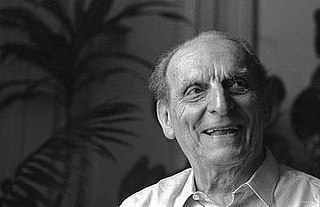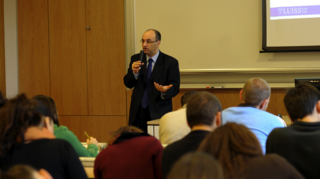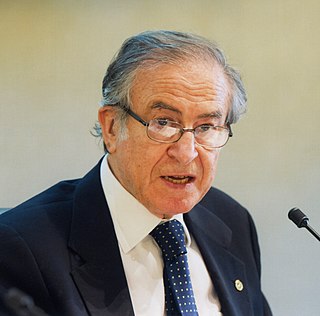
Norberto Bobbio was an Italian philosopher of law and political sciences and a historian of political thought. He also wrote regularly for the Turin-based daily La Stampa. Bobbio was a social liberal in the tradition of Piero Gobetti, Carlo Rosselli, Guido Calogero, and Aldo Capitini. He was also strongly influenced by Hans Kelsen and Vilfredo Pareto. He was considered one of the greatest Italian intellectuals of the 20th century.

Giovanni Sartori was an Italian political scientist who specialized in the study of democracy, political parties, and comparative politics.

Gianfranco Miglio was an Italian jurist, political scientist, and politician. He was a founder of the Federalist Party. For thirty years, he presided over the political science faculty of Milan's Università Cattolica. Later on in his life, he was elected as an independent member of the Parliament to the Italian Senate for Lega Nord. The supporters of Umberto Bossi's party called him Prufesùr, a Lombard nickname to remember his role.

Gianfranco Pasquino is an Italian political scientist.

A democratic transition describes a phase in a country's political system as a result of an ongoing change from an authoritarian regime to a democratic one. The process is known as democratisation, political changes moving in a democratic direction. Democratization waves have been linked to sudden shifts in the distribution of power among the great powers, which created openings and incentives to introduce sweeping domestic reforms. Although transitional regimes experience more civil unrest, they may be considered stable in a transitional phase for decades at a time. Since the end of the Cold War transitional regimes have become the most common form of government. Scholarly analysis of the decorative nature of democratic institutions concludes that the opposite democratic backsliding (autocratization), a transition to authoritarianism is the most prevalent basis of modern hybrid regimes.

Pietro Scoppola was an Italian historian, academic, and politician.

Ilvo Diamanti is an Italian political scientist.
Daniel Innerarity Grau is a Spanish philosopher and essayist.

Sabino Cassese is an Italian jurist, former minister for the public function in the Ciampi government (1993–1994), and judge of the Constitutional Court of Italy (2005–2014).
Donatella della Porta is an Italian sociologist and political scientist, who is Professor of political science and political sociology at the Scuola Normale Superiore. She is known for her research in the areas of social movements, corruption, political violence, police and policies of public order. In 2022, she was named a fellow of the American Academy of Arts and Sciences.

Michele Sorice is an Italian sociologist and political scientist known for his work in the fields of political communication, political science and critical media studies. He is the author of over 25 books and 50 articles.
The Istituto Affari Internazionali (IAI) (English: Institute of International Affairs) is an Italian international relations think tank, and non-profit organisation founded in 1965 by Altiero Spinelli. It is ranked among the global top-20 think tanks in the "Foreign Policy and International Relations" category, according to the 2020 Global Go To Think Tank Index.

Roberto Esposito is an Italian political philosopher, critical theorist, and professor, notable for his academic research and works on biopolitics. He currently serves as professor of theoretical philosophy at the Scuola Normale Superiore in Pisa.

Stefano Rodotà was an Italian jurist and politician.
Sergio Fabbrini is an Italian political scientist. He is Head of the Department of Political Science and Professor of Political science and International relations at Libera Università Internazionale degli Studi Sociali Guido Carli in Rome, where he holds the Intesa Sanpaolo Chair on European Governance. He had also the Pierre Keller Visiting Professorship Chair at the Harvard University, Kennedy School of Government (2019/2020). He is the co-founder and former Director of the LUISS School of Government He is also recurrent professor of Comparative Politics at the Institute of Governmental Studies at the University of California at Berkeley.

Marco Tarchi is an Italian political scientist. He is currently full professor of Political Science, Political Theory and Political Communication at the Cesare Alfieri School of Political Sciences of the University of Florence. His research is focused primarily on populism, democracy, political organization, and extreme right.

Alberto Quadrio Curzio is an Italian economist. He is Professor Emeritus of Political Economy at Università Cattolica del Sacro Cuore, Milan, President Emeritus of the Accademia Nazionale dei Lincei and President of the International Balzan Foundation "Prize".

The New Conservative Party, known as The Conservatives from February 2022 to October 2023, is a liberal-conservative political party in Latvia.

Stefano Bartolini is an Italian political scientist and professor at European University Institute in Florence, Italy. He is the author of many books and publications.















